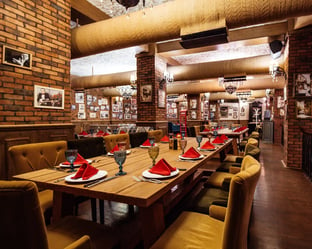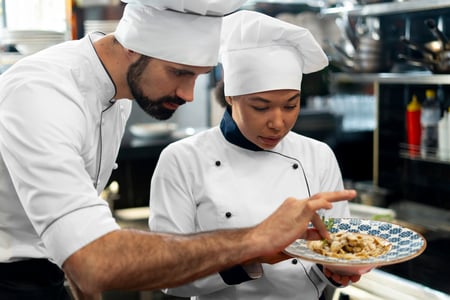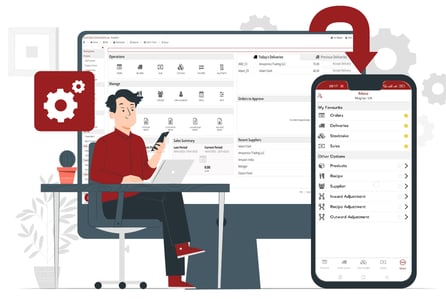
Do you want to come up with a successful restaurant this 2024?
Starting a restaurant is not as big of a challenge as it sounds.
Many individuals, passionate about food and hospitality, find the prospect of starting a restaurant business extremely exciting. Food enthusiasts these days are looking towards becoming entrepreneurs by opening a restaurant. It can be an authentic restaurant or even a cloud kitchen. Yet they must navigate from conceptualisation to reality with detailed planning and execution otherwise the losses can be huge.
Testing the waters is not as challenging as it sounds in the world of hospitality. Yes, problems may arise, but they can be overcome if worked on properly.
Let us follow a roadmap that would help aspiring restaurateurs in the UK for an impactful launch of their successful eatery this 2024.
Table of Contents
- Market Research and Concept Development
- Legal and Regulatory Requirements
- Business Planning and Funding
- Location Selection and Lease Negotiation
- Designing the Restaurant Space
- Procuring Equipment and Suppliers
- Menu Development and Pricing Strategy
- Hiring and Training Staff
- Marketing and Branding
- Technology and Integration for Efficiency
- FAQs
Market Research and Concept Development
Any restaurant's success hinges on two fundamental aspects understanding the market landscape and defining a unique concept to stand out. To identify consumer preferences, competitors, and emerging trends conduct thorough market research. Before you jump in the waters make sure to discover your restaurant's concept, cuisine type, service style, ambience, and target demographic diligently.
- Identify target demographic based on location and dining preferences.
- Analyse market trends and competitor offerings.
- Develop a unique concept that works well with your target audience.
- Set up a space that is welcoming.
Legal and Regulatory Requirements
To ensure compliance and sidestep potential setbacks, one must navigate through essential legal and regulatory requirements. This process involves familiarising oneself with various aspects such as licensing, health & safety regulations, and food hygiene standards. All of these must comply with the UK's restaurant industry as not considering them can lead to major threats. Do now not overlook employment legal guidelines while hiring in your restaurant as do not want to get into legal hassle later on.
- Obtain important permits and licences, along with alcohol license and exchange of use allow.
- Ensure compliance with food hygiene standards and protection policies.
- Understand employment laws associated with hiring and managing staff.
- Keep tabs on the permits if they are nearing their expiry date.
- If a brand new regulation is established, make sure to get permits
Business Planning and Funding
Your restaurant's success depends on a nicely crafted business plan. It will function as your roadmap and is vital for securing investment from investors or economic establishments. Your plan ought to define the concept of your restaurant, its goal marketplace, a competitive analysis, and an advertising approach. It also requires well-researched tactics designed to drive customer acquisition, retention, and growth otherwise a single missing element can obstruct your funding. Key points can ensure your proposal is thoroughly checked by the potential stakeholders. An operational blueprint on the other hand ensures seamless implementation of all activities that take place.
- Develop a complete business plan highlighting the objectives and strategies.
- Get funding through loans, grants, or investments from investors and different financial institutes.
- Conduct thorough financial planning, including budgeting and forecasting.
- Have a detailed analysis of the strategy to give better insights.
Location Selection and Lease Negotiation
The success of your restaurant can work significantly upon the strategic selection of its location. Factors like foot traffic, accessibility, and competition both direct and indirect, within close proximity or across town matter in the industry and cannot be overlooked. Customer preferences of your target demographic group need to be considered when selecting a perfect location. You must engage in negotiations for lease terms which dovetail precisely with both your business needs as well as budget constraints. It will be a key determinant in ensuring optimal profitability for the venture ahead.
If looking for a cloud kitchen venture, make sure to get a location that can cater to more people and is easy to deliver from. Cloud kitchens do not ask for a big space, but they still need an address from where the order is to be picked up. An easily accessible place will give you more orders.
- Research potential locations based on target demographic and market analysis.
- Evaluate lease agreements, including rent, lease term, and tenant responsibilities.
- Negotiate favourable lease terms and secure a suitable commercial space.
- Get a location which has moderate traffic.
- Ensure you have enough parking space in the area.
Designing the Restaurant Space
To create a memorable dining experience, the restaurant’s design should be eye-catching and soothing. Make sure seating preparations and lighting fixtures are properly constructed. Ensure that your decor reflects your brand identity and aligns with the concept of your food point.
For example, in case your restaurant desires to cater to a young target audience provide free wifi and a selfie spot. It gets extra attention from the tech-savvy generation. On the other hand, in case you want to get book fanatics, make a library, and get hold of some good books on the shelves. Customers might get to enjoy their favourite book with a cup of coffee, and you will get greater footfall.
- Work with designers to create a good dining space.
- Incorporate branding elements and design features that enhance the dining atmosphere.
- Ensure accessibility and comfort for guests while optimising space utilisation.
- Create unique spaces or get unique items that people will appreciate.
Procuring Equipment and Suppliers
To keep up with efficiency and deliver exceptional meals, one needs to put money into proper equipment and reliable suppliers. Source your Kitchen fixtures, and decor from reliable suppliers to stop getting into future troubles. Make sure to align them with both your restaurant style as well as its price range.
If you are on a budget and need to get second-hand equipment, make sure to test it properly before you get it. Otherwise, it can lead to additional expenses or unhappy customers if it abruptly stops running.
- Select suppliers for kitchen gadgets, furnishings, and decor cautiously.
- Ensure the equipment is dependable.
- Maintain relationships with food and beverage suppliers to get exceptional resources.
- Create a theme and get utensils based on that theme.
- Ensure the equipment you get comes with a warranty so that you do not have additional expenses later on.
Menu Development and Pricing Strategy
Crafting a menu and pricing strategy is the key to not only attracting customers but also maximising profitability in the hospitality industry. Develop a menu that caters to numerous tastes and showcases your culinary expertise at the same time. Strike a balance in pricing strategies as your food ought to be pocket-friendly and not make you incur losses.
Craft a menu that matches your restaurant’s style, and make sure it has allergen information to make it less difficult for the group of workers and the customers. You can create digital menus to save paper and make it easier to order for humans.
- Create a menu that displays your restaurant's concept and target clientele.
- Incorporate seasonal substances and hop on to new developments.
- Develop pricing primarily based on meal value and competitor pricing.
- Have the option of virtual menus to make ordering less difficult.
- Ensure menus have portion sizes and images to help the customers.
Hiring and Training Staff
Getting the right set of staff is essential for delivering premium service and maintaining operational efficiency. Your restaurant's size, along with its service style plays a major role in this but does not define your staffing requirements. To guarantee customer satisfaction and to keep staff trained, keep regular training sessions for new and old staff.
- Set proper requirements for kitchen, front-of-house, and managerial staff.
- Recruit a qualified workforce who gels together with your restaurant's lifestyle.
- Provide ongoing training to enhance workforce talents and performance.
- Incorporate tech and make it easy for the working personnel.
Marketing and Branding
Attracting customers and growing awareness makes one use effective advertising and marketing strategies. It is essential to develop a complete plan that aligns each advertising platform to help you grow. Cater the net with social media and websites and utilise printing media to attain a much wider audience. Moreover, resonating with your restaurant’s concept and values facilitates you to get the right brand identity. It will not only strengthen customer loyalty but also separate you from competitors in an increasingly saturated market.
- Digital marketing is the key to thriving. Use social media, email marketing, etc.
- Leverage day-old local advertising, print media, and community outreach.
- Establish a unique brand identity through visuals, messaging, and customer reviews.
- Use SWAT analysis to check your target audience.
- Send offers to grab the immediate attention of the customers.
Technology and Integration for Efficiency
By embracing technology, restaurant operations can undergo streamlining and customer experience enhancement. Therefore, investing in software for restaurant management, point-of-sale systems, and online ordering platforms is essential to bolster efficiency along with customer service. Integrating technology solutions that facilitate seamless communication as well as data management.
- Remove major discrepancies with the use of technology
- Save time and labour by digitising
- Check reports from anywhere at any time.
- Implement restaurant management software for inventory control, work scheduling, and daily reporting.
- Utilise point-of-sale systems.
- To increase revenue possibilities and reach a broader target audience, offer online ordering and delivery.
FAQs
What are the key considerations when choosing a restaurant location?
- Keep a check on foot traffic and target audience.
- Evaluate lease agreements, including rent, lease term, etc.
- Negotiate favourable lease terms to secure a suitable commercial space.
- Ensure a good view if possible.
How can I secure funding for my restaurant business?
- Develop a business plan with objectives and key points
- Secure funding through loans, grants, or investments from backers and investors.
- Conduct proper financial planning with budgeting and forecasting.
What legal permits and licences are required to open a restaurant in the UK?
- Alcohol licence and change of use permit.
- Ensure compliance with health and safety regulations and food hygiene standards.
- Comprehend employment laws related to hiring and managing staff.
- Music licence if your restaurant requires
How do I develop a menu that appeals to my target demographic?
- Create a menu that has a reflection of the restaurant's concept.
- Incorporate seasonal ingredients and follow trends.
- Develop prices based on food cost analysis and competitor pricing.
What marketing strategies are most effective for promoting a new restaurant?
- Use digital marketing such as social media, email marketing, and content creation.
- Do not underestimate SEO.
- Make use of local advertising, print media, and community outreach.
- Create a unique brand identity.
Final Thoughts
To begin a restaurant enterprise within the UK, one must cautiously plan, execute, and devote their time to the right marketing strategy. Aspiring restaurateurs can be part of the loads and work through the intricacies of starting a successful restaurant using running at the factors above. Get innovative, pay attention to purchaser satisfaction, and live dedicated to serving fine cuisines to have returning clients. Keep calculating your food costs timely so that you know your recipe is making profits. If you need the restaurant food cost formula, we have you covered. With the proper method, your dream of a restaurant can indeed turn into a full-grown place within the ever-changing UK dining scene.
StockTake Online
The restaurant industry can revolutionise its inventory management by joining hands with modern tech such as StockTake Online. Through using inventory software, restaurant owners can streamline operations, minimise waste and maximise profits without an awful lot of daunting labour. Equipped with real-time reviews and allergen add-on adaptive recipes STO makes it extraordinarily smooth for the hospitality industry. Stay ahead within the UK's competitive market for restaurants with our software. Join StockTake Online, the future of inventory management, and drive your restaurant to incredible stages of fulfilment in 2024.

